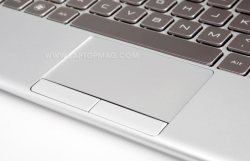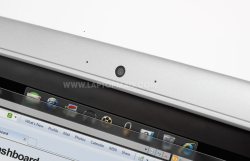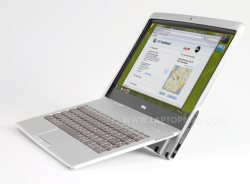Laptop Mag Verdict
The thinnest notebook ever made is also one of the most stylish, but it has more to offer than just great looks.
Pros
- +
Extremely thin
- +
Stylish, innovative design
- +
Good sound quality
- +
Quick boot time
Cons
- -
Short battery life
- -
Mediocre Wi-Fi range
- -
Battery hard to remove
Why you can trust Laptop Mag
When it was first announced last year, the Dell Adamo XPS garnered attention for its wafer-thin profile: at just 0.4 inches thick, it was the thinnest notebook ever, and still is. More importantly, the notebook represents an engineering marvel, as most of its components--the motherboard, hard drive, etc.--are crammed into the deck of the keyboard, itself just a quarter of an inch thick. It's not just that this notebook is thin, though; it has a completely unique elevated design. Of course, there's a premium for this brand of uniqueness, and while we love the design, the Adamo XPS' performance and endurance don't quite live up to its $1,900 price.
Editor's Note: Although no longer offered on Dell's site, you can still find the Adamo XPS for sale at Best Buy and Amazon.
Design
While many notebook makers boast about the fact that their laptops are less than an inch thick, the Adamo XPS is in a class by itself; at just 0.4 inches thick, it's almost half that of the MacBook Air (0.7 inches). In order to achieve that, the keyboard tucks into a recess made by a thick screen bezel.
Otherwise, the Adamo XPS' footprint (13.4 x 10.8 inches) is similar to most other 13-inch systems. With the regular battery attached, the Adamo XPS weighs just 3.2 pounds; the extended battery increases the weight barely, to 3.4 pounds. That's 0.4 pounds more than the MacBook Air and Sony VAIO Z Series, but when this system is tucked into a messenger bag, it virtually disappears.
The chassis of the Adamo XPS is made of magnesium, and wrapped in aluminum that not only looks great, but doesn't show any fingerprints. Opening the system, you see that the deck is also swathed in aluminum, and set off by the darker metal of the island-style keyboard.
Uniquely, the keyboard is hinged about an inch above the bottom of the notebook, so that it angles downwards, creating a large space at the bottom of the notebook. Unlike every other notebook, the XPS only comes into contact with a table (or your lap) at the bottom edge of the keyboard deck and the bottom edge of the battery. Although the screen is tilted back to such a degree that the system looks in danger of tipping over when in your lap--especially with the extended battery--it's weighted in such a manner that it remains securely in place. All in all, it's a wonderfully novel design, but isn't the most practical for those who like to lie on a couch and surf the Web.
Another unique feature of the Adamo XPS is the manner in which you open it. You won't find any mechanical latches on this notebook; instead, there's a small indentation along the top edge of the lid that's actually a capacitive touch sensor. Slide your finger across it while the notebook is closed and a small array of blue lights will flash, Knight Rider-style, and the keyboard will pop open. The keyboard is held in place by a piece of memory wire: When the latch is activated, the wire is heated ever so slightly, and the wire changes shape, allowing the keyboard to open. Just keep in mind that you can't open the notebook if the battery is drained and the system isn't plugged in.
Heat
Being the thinnest system on the market, it's not surprising that the Adamo XPS has a littletrouble dissipating heat, but Dell did a good job mitigating any unpleasantness for the user. After playing a Hulu video at full screen for 15 minutes, the touchpad measured 92 degrees Fahrenheit and the space between the G and H keys was 93 degrees. The middle of the underside was an unpleasant 107 degrees, but since it's elevated, that area of the notebook does not come into contact with your skin while on your lap. However, the right wrist rest got up to 100 degrees.
Keyboard and Touchpad

Click to enlargeThe island style keyboard is made of a darker metal than the rest of the deck, bringing to mind those of the Apple MacBook Pro or the HP Envy 13. When opened, the keyboard is angled at 13 degrees, which made for a comfortable typing position. Despite its thinness, the keys offered decent travel, and were snappy when typing; we were up to our usual rate in no time, and had no trouble typing this review on the notebook. Above the keyboard is the row of function keys which, while the same color as the rest of the keyboard, are flush with the deck. The furthest button to the left is an eject button, which seems odd considering the Adamo XPS lacks an internal optical drive. (Dell offers a matching external drive as an option.)
Measuring 3 x 1.7 inches, the touchpad on the Adamo XPS is decently sized, and offered little resistance while sliding our finger across. Multitouch gestures are enabled, and we found it easy to pinch to zoom in on photos and documents. Two discrete mouse buttons below were a touch soft, but were otherwise fine.
Display and Audio
When opened, the screen is tilted about 25 degrees back from vertical; not surprisingly, this is the ideal angle from which to view content. Tilting the screen back or forward caused the image to degrade, and the glossiness of the display also impinged on viewing angles. Otherwise, the 13.4-inch, 1366 x 768-pixel screen was bright and crisp when watching Hulu and viewing photos.
The stereo speakers, located on the underside of the keyboard near the hinge, were louder than we expected, or should have been, given their size; this is partly an effect of sound waves being able to resonate in the space underneath the keyboard. While the funky bass line in Stevie Wonder's "I Wish" was slightly lacking, and cymbal crashes were somewhat distorted, we were pleasantly surprised by the volume. We could hear the Adamo XPS clearly from several feet away.
Ports and Webcam

Click to enlargeAt the base of the notebook by the battery are two USB ports, one on each side, and a DisplayPort on the left. On the right is a headphone and mic port. Helping make up for this paucity of ports is a dongle that comes with the unit, and allows users to connect Ethernet and DVI. An optional VGA and HDMI dongle costs extra.
The 2-megapixel webcam offered fairly good visuals while chatting with a friend over Skype, but he noted that the image froze every now and then; however, this was most likely due to our Internet connection.
Performance
The 1.4-GHz Intel Core 2 Duo U9400 and 4GB of RAM powered the Adamo XPS to a PCMark Vantage score of 3964, 1200 points above the ultraportable average. The only other system with similar specs--the Samsung X360, which had the same processor and a 128GB SSD--scored 3,184. Still, the Sony Vaio Z, which costs $100 more, but has a 2.4-GHz Intel Core i5-520M processor and two SSDs, scored two and a half times higher: 9936.
The Adamo XPS' Samsung 128GB SSD (PB22 JS3) was quite zippy, booting the 64-bit Windows 7 Home Premium operating system in just 33 seconds.
The drive duplicated a 4.97GB folder of multimedia files in 1 minute and 54 seconds, a rate of 44.6 MBps. While that's more than twice the ultraportable average (21.6 MBps), it pales in comparison to the Vaio Z's transfer rate of 127 MBps (which has twin SSDs).
Transcoding a 114MB MPEG-4 to AVI using Oxelon Media Encoder took 1 minute and 46 seconds, 12 seconds faster than the ultraportable average, but about a minute longer than the Vaio Z.
Predictably, graphics scores from the integrated Intel GMA4500MHD GPU were pretty low. The Adamo XPS scored just 701 on 3DMark06, about 150 points below the category average, and other recent 13-inch systems, such as the Lenovo ThinkPad Edge 13 (908), and the Sony Vaio Y (906). The Sony Vaio Z's integrated graphics also proved far superior, notching 1,900 on the same test.
When playing World of Warcraft at 1024 x 768 and with graphics set to default, we eked out just 23 frames per second. Still, the machine was powerful enough to make for a smooth experience when flying around New York City in Google Earth.
Battery Life and Wi-Fi
One area where the Adamo XPS comes up short compared to other ultraportables is endurance; the extended 3,520 mAh battery lasted just 3 hours and 46 minutes on the Laptop Battery Test (Web surfing via Wi-Fi); that's close to two hours less than the ultraportable average (5:35), not to mention the similarly priced Sony Vaio Z (5:21). The regular battery has a capacity of 1760 mAh, and lasted just 1:52; that's half an hour less than the desktop replacement average.
When purchased through Best Buy (which is the only way to buy the Adamo XPS now), the notebook ships with both a regular and extended battery; since the extended battery only increases the weight by 0.2 pounds to 3.4 ounces, and adds almost 90 minutes to the battery life, there's little sense in using the smaller of the two. Also, it's exceedingly difficult to remove the battery; you feel as if you're going to break the system, something you don't want to do on a laptop that costs two grand.
Throughput from the Intel WiFi Link 5300AGN was decent, but not spectacular. At 15 feet from our access point, we saw throughput of 26.4 Mbps, which is about 4 Mbps faster than average, but about 10 Mbps slower than the Viewsonic VNB131, and about 18 Mbps below the Sony Vaio Z. At 50 feet from our access point, the connection was much worse, just 12.5 Mbps. That showing is about 6 Mbps slower than the ultraportable average.
Software and Warranty

Click to enlargeThis being a $2,000 system, Dell can afford to skip the trialware that bogs down lower priced laptops. It only bundles the Adamo XPS with only useful software. In addition to the Dell Dock, the notebook comes with a 15-month trial of McAfee SecurityCenter, Dell QuickSet, Phoenix FailSafe theft protection, and Sensible Vision FastAccess facial recognition software.
Using Wi-Fi triangulation powered by Skyhook (which queries nearby hotspots to fix your position), the Adamo has two Gadgets on the desktop that provide local information. One shows the temperature and weather conditions in your relative area (it placed us in Chelsea, though we're just north, in the Garment District and closer to Midtown). The other Gadget, called Places, can locate points of interest, such as coffee shops, ATMs, or movie theaters, nearby. When closed, the Gadget simply shows a number, like "17", indicating how many such places are nearby. Not particularly helpful, but clicking on an arrow to the right opens a map, showing those locations with search results provided by Bing.
The Adamo XPS comes with a one-year warranty and 24/7 customer support, but for the price we think you should get two years of proteciton. You can also purchase an optional 90 days of Adamo Premium Service. To see how Dell fared in our customer support showdown, click here.
Verdict
Just as supermodels can't eat cheeseburgers, some sacrifices had to be made in order to keep the Adamo XPS as thin as it is. Its battery life is subpar for such a thin and light notebook, and its performance is equal to systems that cost half as much. While it's not nearly as thin, the lighter Sony Vaio Z ($2,099) offers tons more horsepower and endurance in a thicker package; if you don't have a corner office, the Sony Vaio Y ($799) or Asus UL30A ($679), both of which offer better endurance and comparable performance, may be more to your liking. The Dell Adamo XPS may be expensive, and may not have the greatest specs, but damn it looks good.
Dell Adamo XPS Specs
| Bluetooth | Bluetooth 2.1+EDR |
| Brand | Dell |
| CPU | 1.4GHz Intel Core 2 Duo SU9400 |
| Company Website | www.dell.com |
| Display Size | 13.4 |
| Graphics Card | Intel GMA 4500MHD |
| Hard Drive Size | 128GB |
| Hard Drive Type | SSD Drive |
| Native Resolution | 1366x768 |
| Operating System | MS Windows 7 Home Premium (64-bit) |
| Ports (excluding USB) | DisplayPort, Combo Headphone/Mic Jack |
| RAM | 4GB |
| RAM Upgradable to | 4GB |
| Size | 13.4 x 10.8 x 0.4 inches |
| USB Ports | 2 |
| Video Memory | 256MB |
| Weight | 3.4 pounds |
| Wi-Fi | 802.11b/g/n |
